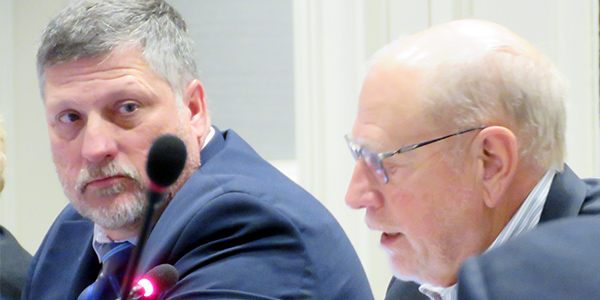By Rich Heidorn Jr.
ATLANTA — The NERC Board of Trustees last week approved the merging of the Planning, Operating and Critical Infrastructure Protection committees and named Greg Ford as chairman of the panel that will replace them.
Ford, CEO of Georgia System Operations, is completing a term as chair of the Member Representatives Committee (MRC). MISO’s David Zwergel will be vice chair of the new panel, which is named — for now — the Reliability and Security Technical Committee (RSTC). Both will serve two-year terms.
Board Chair Roy Thilly said the new committee was welcome to change the name, noting concerns that the RSTC could be confused with the RISC — the Reliability Issues Steering Committee. “We do live in acronym hell,” Thilly joked.
“We talked about that on the board, and rather than having an extensive debate at this moment, we decided … to kick the can down the pike and … empower the new committee to propose a new name if they so choose,” he said.
Thilly called the approval of the merger and the RSTC Charter “a major step, with a lot of work in front of it.”
He said he appreciated “all the comments that came in, because it really made it better.” As a result of stakeholder feedback, the number of sector representatives was doubled and the sectors, rather than the board, will select them. (See Revised NERC Committee Merger Plan Released.)
While the three retiring committees totaled almost 120 members, the RSTC will have 34 voting members: two each from sectors 1-10 and 12, 10 at-large members, a chair and a vice chair. Terms for the new committee members will expire in June of alternating years. The initial membership will be split between two- and three-year terms, after which terms will run for two years.
Any unfilled sector seats will be filled by an at-large member until the term expires.
There will be five nonvoting members: the NERC secretary, two for the U.S. federal government, and one each for the Canadian federal and provincial governments.
SET to ‘Wind Down’

The merger plan was developed by the Stakeholder Engagement Team (SET), led by Co-Chairs Jennifer Sterling, of Exelon, and Mark Lauby, of NERC.
“The SET is planning to live by example and wind down now that we have our deliverable,” said Sterling, who is succeeding Ford as MRC chair next year. “Any [additional changes to the transition] will be handled in the detailed implementation plan that the new committee will develop.”
One of the RSTC’s first work products will be reviewing the subcommittees, working groups and task forces under the three retiring committees and “eliminate or combine any of those that don’t really have recurring responsibilities or a defined deliverable,” Sterling said.
Three-week Sector Nominating Period
The transition will begin with the nomination of sector nominees, which will open this Tuesday and end Dec. 6. Sterling and sector leaders agreed to delay the opening of nominations by a week — they were originally scheduled to begin Wednesday — at the request of Bill Gallagher, a representative of the Transmission-Dependent Utility sector.
Gallagher said the delay would give sectors time to seek consensus on their two representatives. “We think it’s important to be able to do that because it gives us an opportunity to work behind the scenes to be sure that we get the right people to be running for these elections,” he said. “We think it would be a little bit smoother.”
“Is your concern that during that first week that somebody will nominate themselves without being vetted by your sector?” Sterling asked.
“Yes,” Gallagher replied. “If you look at the TDU sector, today we have six people that are serving on these three committees that are now going to be reduced to two people. We’d like to have an opportunity to influence the right people to make those transitions.”
None of the other sectors voiced opposition to reducing the nominating period when asked by Sterling.
“The voting would take care of [Gallagher’s concern], but it’s probably better not to get into that situation,” said Sylvain Clermont, a representative of the Federal/Provincial Utility sector.
Transition Schedule
The transition to the RTSC will take about eight months:
- Dec. 6: Sector nomination period ends. NERC staff to conduct sector elections, if necessary, by Dec. 20.
- Dec. 9 to Jan. 3, 2020: Open at-large nomination period. NERC staff/SET analyze sector representatives’ expertise and regional mix for gaps to be filled by at-large members. The goal is to have at least one representative from each interconnection and regional entity footprint, and a mix of subject matter expertise (planning, operating and security), organization type (cooperatives, investor-owned utilities, public power, power marketing agencies, etc.) and geography (Canada, Mexico and U.S.).
- Jan. 6-15: Nominating Subcommittee to develop slate of at-large nominees for presentation to the board.
- Feb. 6: Board appoints RSTC members (sector and at-large).
- Feb. 7 to May 29: RSTC develops transition plan and work plans for itself and subcommittees.
- March 3-4: OC, PC and CIPC meet as scheduled.
- March 4: RSTC holds its inaugural meeting.
- June 2020: OC, PC and CIPC meet for final work plan approvals and to complete any other approvals. RSTC holds initial regular meeting with subcommittee reports and other agenda items.








